The city that was once declared “Pensioners’ Paradise” has seen its elderly population treading the murky grounds of COVID since the past year. Data from the Health and Family Welfare Department of Karnataka tells us that while around 19,000 people were infected in the age group of 15-29 years from March 5 to April 5 as opposed to around 10,000 in the bracket of above 60 years, only 4 people died in the former age group against 214 senior citizens who succumbed to COVID. This means that the younger folks are getting infected more but they are recovering unlike senior citizens who may not be getting infected as much but their fatality rates are higher.
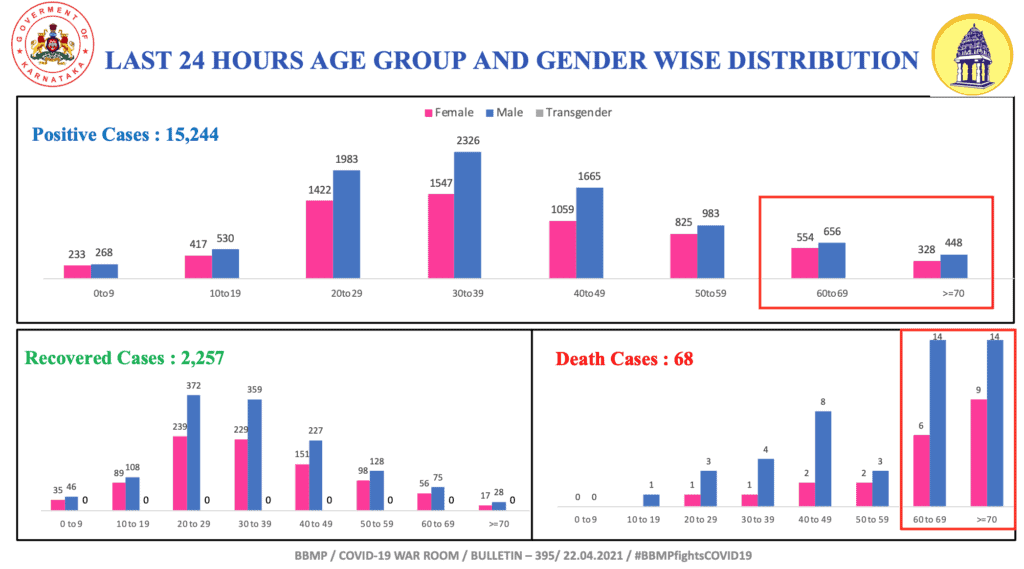
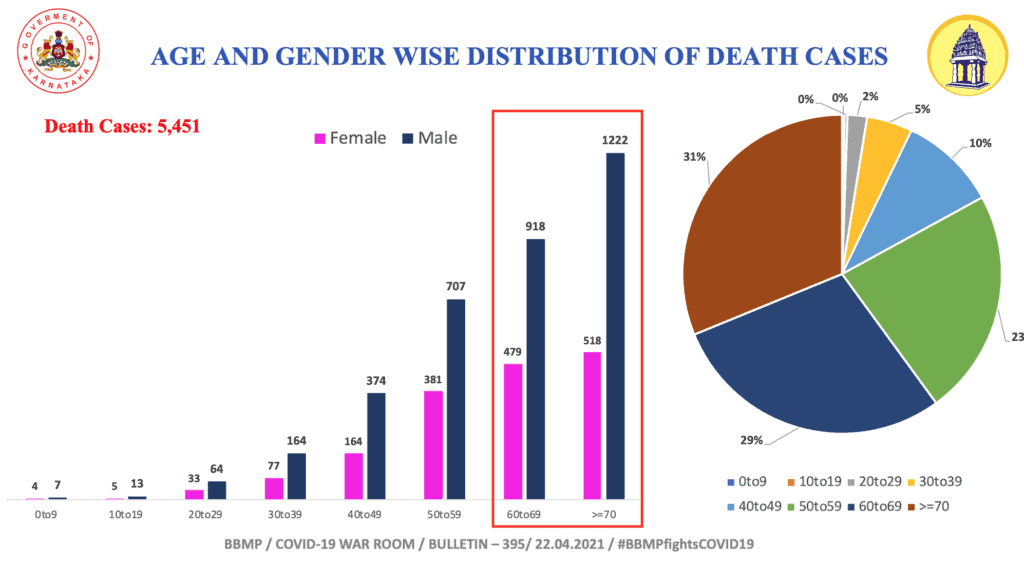
Read More: Help for senior citizens during COVID-19 lockdown
In a 2016 study done on elder abuse and neglect among patients in a medical college hospital in Bengaluru, a correlation of abuse was found with lack of social support, financial dependence, and depression among the elderly. This means that not all senior citizens are the same. There are different determinants which play a role in making an elderly person vulnerable.
“Some people think that senior citizens manufacture COVID; they don’t want to come near them.”
Raghu Nanda, managing trustee, Sudhama Old Age Home, RR Nagar
In conversations with senior citizens from different socio-economic backgrounds, these differences came out starkly. While retired professionals spoke of loneliness and anxiety, those who are still working to earn a living highlighted the livelihood challenges, vaccine hesitancy, and problems in receiving pension.
While loneliness was not a big occurrence among those in an old age home, those living alone and away from their children felt particularly isolated and worried about their children’s health. Radhika, who stays with her daughter called the lockdown “a bonus” because of the time she got to spend with her child. Digital connectivity was helpful for those who had access to the digital infrastructure such as smartphones, while those who did not possess such phones were deprived of this solace during lockdown.
Read More: “Middle-class senior citizens left in the lurch during lockdown”
Inside an old age home
In the Sudhama Old Age Home, the senior citizens were more or less insulated from the pandemic. They were less affected by the lockdown because an old age home is already a controlled setting with less contact with the outdoors. While visitors were not allowed to come after the lockdown in the home, the senior citizens expressed no feeling of change perhaps because they anyway are not used to visitors.
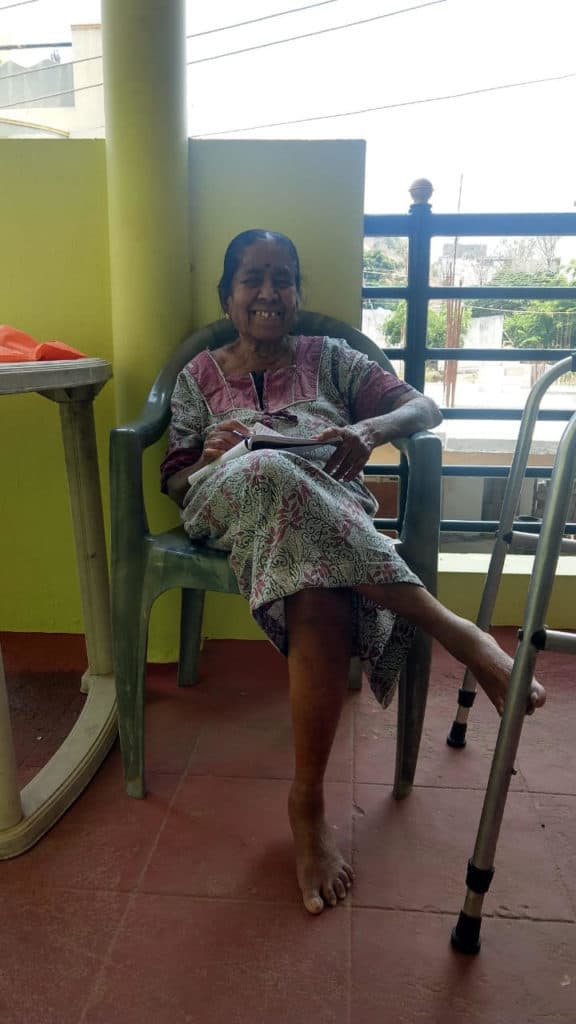
The management had to have uncomfortable conversations with their staff though. “Those who wanted to visit their native home, we told them that if you are going, don’t come back. Stay there. We only allowed those who came back with negative reports”, said Raghu Nanda, the home’s Managing Trustee. They had to request their staff to stay inside the old age home and restrict their movement. Thus, it was the staff who ended up bearing the brunt of the senior citizens’ isolation.
Raghu arranged vaccination for the senior citizens institutionally but had trouble with those who did not have identity documents. Some senior citizens may not always be able to prove their citizenship or age which has implications for their access to the healthcare system and mass vaccination drives.
Another challenge that Raghu faced was the inability to vaccinate those senior citizens who were bed-ridden and could not be taken to the nearest hospital. This is where he raised the demand for vaccination-at-doorstep so that senior citizens do not have to be exposed to crowds or queues in the process of being vaccinated.
While they may not have been affected by the restrictions, the elderly were certainly affected by what they were reading and listening in the news. “I was scared. So many people were dying every day. There was definitely fear,” said 86 year-old Sulochana.
Even 78 year-old Jayalakshmi, who is a retired teacher and regularly reads newspapers, confessed, “I was sad as well as scared. The world feels rotten. There was so much loss and even now, we continue to read of loss,” pointing at the newspaper beside her.
Confined to home, anyway
A few other elderly Bengalureans are not feeling a difference about being unable to go out frequently. Sixty-nine year-old Arun Dravid, who has an army background, said, “We were not impacted in our daily lifestyle to that extent because most of us are already confined to home, or going through a retired phase of professional life.”
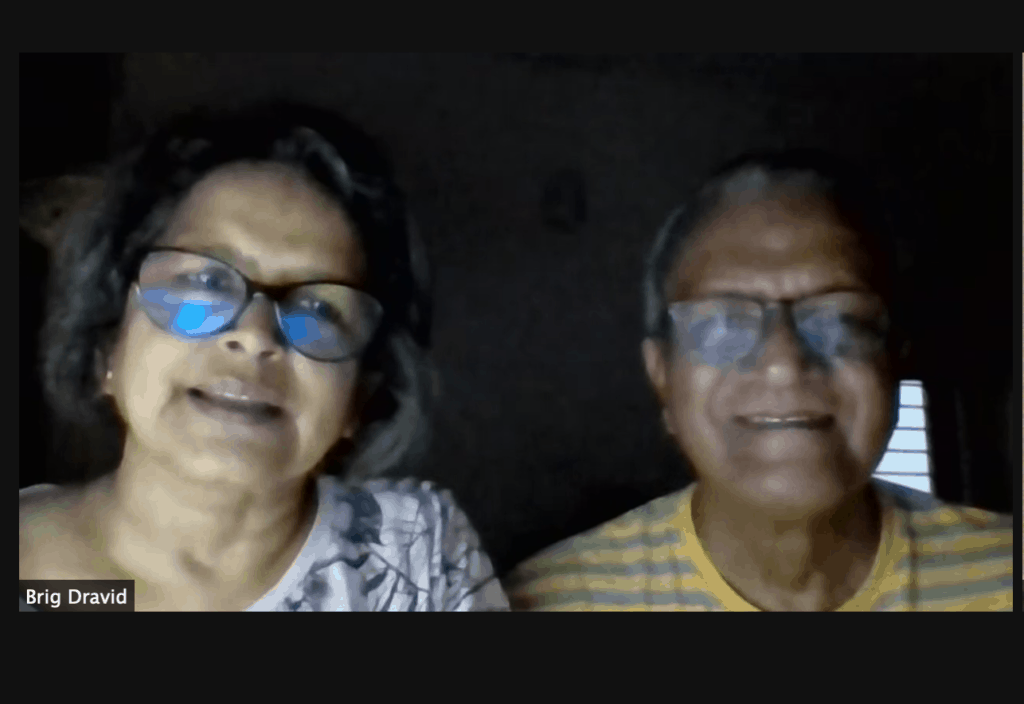
Sixty-three year-old retired journalist and professional Scrabble player, Radhika Mahalingaiah laughingly said, “I am retired, so my socialisation is anyway not very high. I am a journalist by profession, so I’ve had enough of socialisation so now I am very happy with my books. Generally, I am at home. So, it never made any difference.”
Isolation and loneliness
While not being able to go out of the house did not impact certain elderly as much, family members and friends not being able to visit them was certainly traumatising. Arun’s wife Vinaya says, “Doing video calls and being able to connect to our children helped us a lot in this phase because not having children visit us made us lonely and gave us anxiety.”
Read More: Indoor walks, online meetings and more: How a senior citizen is beating lockdown monotony
With this feeling of loneliness, there was also the fear induced by the news and media discourse. “There is a psychological fear that the media created. Precautionary measures should be uniformly communicated by the media. Certain groups should not be stigmatised that these are highly vulnerable, these are absolutely safe, because the objective should have been to keep the youngsters at home because they are the ones who are going to office and moving out,” says Arun.
For Dr. Hemlata Harish, a retired army doctor, the first few weeks were tough: “Being single, I live alone. When the lockdown happened in the beginning, it gave me a feeling of being hemmed in and felt a bit claustrophobic, as I was and have been a very active person.”
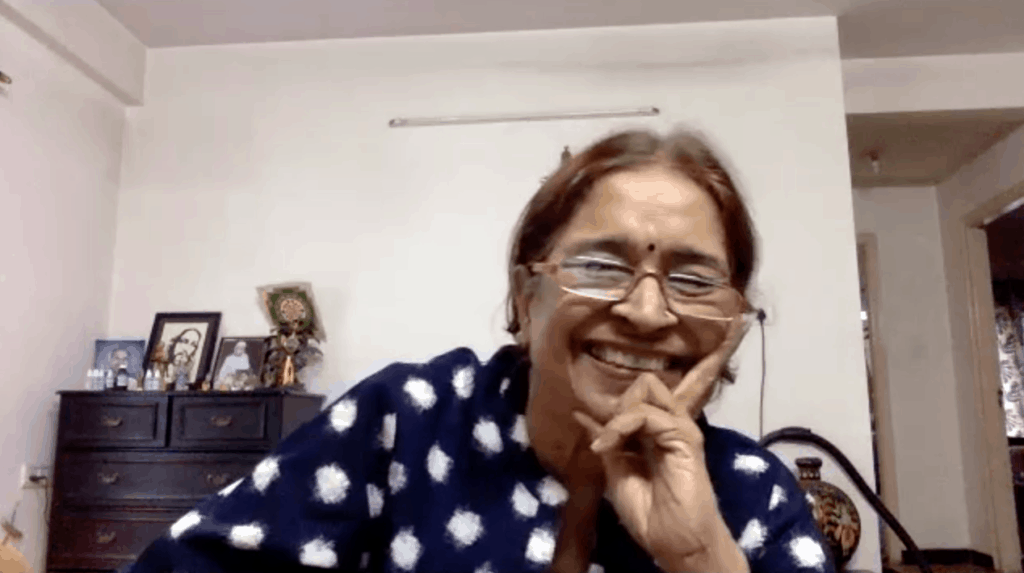
The isolation was overwhelming as she could not continue her work as a trainer in breath-work and meditation. “Frankly, I felt I was unable to handle it and was being dragged down. I then told myself ‘You are a doctor. You are a bold person. You have lived alone. Come on get out of it’.”
She went to her son’s house for a month and as soon as she felt better, she came back to her house and got busy with housework, practicing meditation and breath-work. She has taken the second dose of the vaccine recently and feels no panic whatsoever.
Arun and Vinaya spoke of vulnerability and the burden of housework as elderly who live alone: “The initial strain on the household work without help was a shock. It was like facing the reality of our own vulnerability. Till that time, I used to think I was fit. But, after doing the jhaadu-pocha and bartan, I realised that age is catching up.”
Seventy-nine year-old Patrick, a resident of Koramangala, also expressed appreciation for his apartment’s COVID committee for being able to get a permit for his domestic worker. In fact, he mentioned that his primary caregiver is someone who has worked for him as a driver. Domestic workers have been permitted by the state to continue working. But, this is not without its own complexities.
No paradise for pensioners
The Domestic Workers’ Rights Union (DWRU) has reported that more than 50% of domestic workers above the age of 50 have lost their jobs. Radha from DWRU said, “So many senior domestic workers were fired and they have not been hired again because the employers are afraid that they will bring COVID. Many domestic workers are in this age group of 50-75 and this situation has started again due to the second wave.”
The domestic workers are directly being told by employers that they don’t have any choice because the Resident Welfare Associations (RWAs) have refused to let domestic workers above the age of 50 work in any of the apartments. Many suffer from low blood pressure and sugar problems. Some don’t even have other family members and stay in a single person household, Radha pointed out.
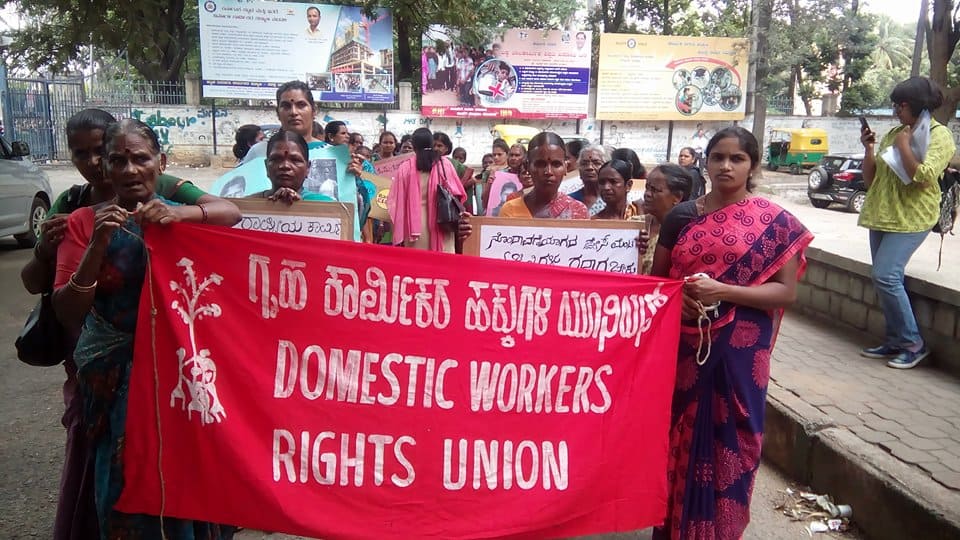
“Our demands for this age group are 1) Re-Employment 2) Pension and 3) Healthcare, because Rs. 500 pension is too less.” When the state allows domestic workers to continue working in the homes of senior citizens, it is making a policy for a particular group of senior citizens who can afford a domestic worker, not those senior citizens who themselves are domestic workers or drivers or cleaners, she said, adding that a domestic worker or a driver cannot work from home.
Rahiman Sharif is a 74 year-old resident of KG Halli who works as the State Coordinate for Dalit Sangharsha Samiti. He raised the issue that most of the senior citizens in KG Halli have no phones. Unlike Arun and Vinaya and many other senior citizens who had the luxury of digital connectivity, a lot of senior citizens had very few ways of dealing with loneliness.
The biggest issue for Mohammad Zahid, a 68 year-old shop-owner in KG Halli, was the losses in his business. He lives with his family but agreed with Rahiman when he said that no elderly person wants to be dependent on their children. Even 67 year-old Afzal who now runs a grocery store in Thomas Town recounted how he had to shut down his stall which was situated near the Banaswadi Railway Station after the trains were stopped. He suffered a heart attack during the months after that and then managed to open this shop.
Rahiman compared the old age pension schemes of Karnataka and Andhra Pradesh. Karnataka’s Sandhya Suraksha Scheme gives old age pension of Rs 400 per month, whereas the YSR Pension Scheme in Andhra Pradesh is Rs 2,250 per month. He said that if the pension amount is increased from 400 to 3,000, the senior citizens would feel a lot more secure.
He also raised the issue of non-payment of pension. Even Radha from DWRU mentioned that after COVID, the senior domestic workers had stopped receiving pension and it was after protesting in front of the Pension Office and Post Office in September 2020 that some of them received pension in December.
Mohammad Zahid was hesitant to take the vaccine because of the rumours of its fatal implications, a consequence of the inadequate communication. Rahiman recommended two-day monetary allowance to senior citizens for getting vaccinated, as they would not be able to work and earn on those days.
Rahiman’s recommendation is not novel. Last month, New York amended its labour law to allow 4 hours of paid leave for every vaccination. The US President declared tax credits for companies that are giving paid leave to those getting vaccinated.
There is also frustration among those who have been confined to their homes for months when they see election rallies and scenes from the state-sanctioned Kumbh Mela. With so many shops being closed over COVID, 68 year old Afzal who runs a grocery store said, “They’ll close our stores but they’ll never punish the politicians who are holding mass rallies and campaigns at such a time.” Patrick exasperatedly said, “It’s the hypocrisy that is frustrating. Have we really learnt nothing since last year?”
When it’s all over…
When asked what will be the first thing they will do when the pandemic is over, a variety of answers came. Patrick said he would jump on a plane and travel the world. Vinaya echoed this by saying she would love to travel to Pondicherry. Arun simply wanted to visit Toit. Dr. Hemlata wanted to get out of her house and conduct workshops on breathing again. Sulochana from Sudhama Old Age Home was excited about having physical dance classes after more than a year. Afzal would like to open the stall he used to run at the Banaswadi Railway Station again. Radhika would simply like to get into a bubble and float away, perhaps to South Goa, for the Scrabble tournament that she virtually participated in last year.
Also Read: